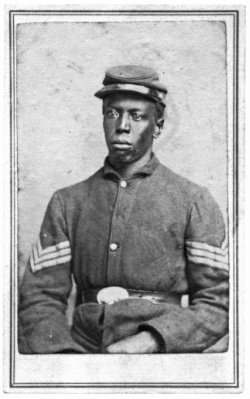What was the impact of the Militia Act of 1862?
 July 17, 1862 — The Militia Act of 1862 was passed today, allowing African Americans to join the Union forces and fight in the Civil War.
July 17, 1862 — The Militia Act of 1862 was passed today, allowing African Americans to join the Union forces and fight in the Civil War.
Although this act was an important step toward freedom and equality of African Americans, the act did not suppress discrimination toward blacks.
Indeed, black troops suffered from unequal treatment, lower pay, and withholding of medical care. Lincoln credited their courage, saying this was “the heaviest blow yet dealt to the rebellion.”
Sources
Words of Wisdom
Dear Wife i have enlisted in the army i am now in the state of Massachusetts but before this letter reaches you i will be in North Carlinia and though great is the present national dificulties yet i look forward to a brighter day When i shall have the opertunity of seeing you in the full enjoyment of fredom i would like to no if you are still in slavery if you are it will not be long before we shall have crushed the system that now opreses you for in the course of three months you shall have your liberty. great is the outpouring of the colered peopl that is now rallying with the hearts of lions against that very curse that has seperated you an me yet we shall meet again and oh what a happy time that will be when this ungodly rebellion shall be put down and the curses of our land is trampled under our feet i am a soldier now and i shall use my utmost endeavor to strike at the rebellion and the heart of this system that so long has kept us in chains ... remain your own afectionate husband until death, Samuel Cabble.
Note: Samuel Cabble returned to Missouri for his wife, and together they moved to Denver, CO. Visit http://cwsoldier.weebly.com/civil-war-letters.html to discover more about Cabble.




